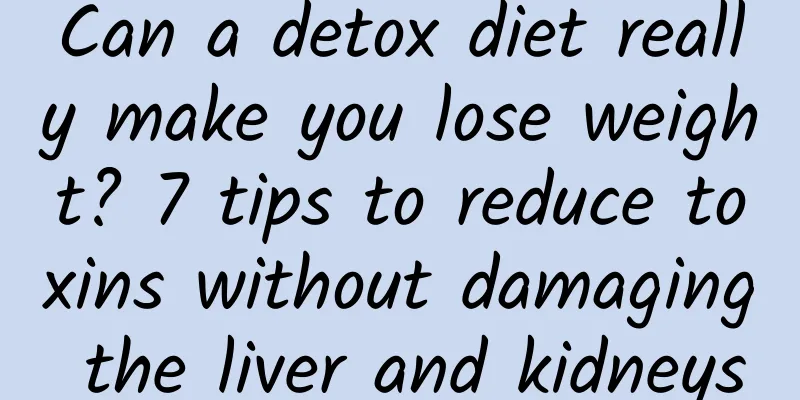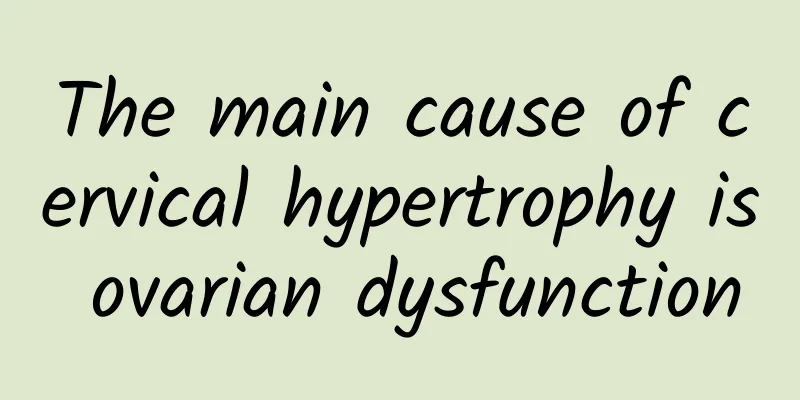Can a detox diet really make you lose weight? 7 tips to reduce toxins without damaging the liver and kidneys

|
Does detox really make you lose weight? When it comes to detoxification diet, it is generally through a short-term (usually one to two weeks) "clean" diet, including drinking plenty of water, juice or high-protein drinks, and eating small amounts of vegetables and fruits to remove "toxins" accumulated in the body. They even have to take "detoxification products", which are generally plant-based laxatives, or even laxatives or diuretics whose ingredients are not clearly stated, which cause diarrhea or frequent urination to achieve the purpose of "detoxification". This method can help people lose weight rapidly within a week or two, and its "weight loss" effect is significant, so it has become popular. But, does it really help you lose weight? Insufficient protein intake and malnutrition are likely to occur during the detoxification process During the detoxification process, meat is prohibited and other foods are also strictly restricted. It is easy to suffer from insufficient protein intake, resulting in malnutrition, hair loss, loss of skin elasticity, brittle and easily broken nails, etc. The body may even have to rely on breaking down muscles to provide the daily energy needed. Xiao Danhua, a doctor of nutrition at Columbia University Medical School and a certified weight loss specialist, said in his new book "Walk the Fat" that the weight loss caused by this extreme method is the loss of water and muscle, not fat; not only can it not be maintained in the long term, but it is also harmful to physical health, and its negative effects may even persist weeks or months after "detoxification." This method of extreme short-term diet control and medication to increase urination and defecation will only make you quickly lose water in your body, not fat. Therefore, it is not truly meaningful weight loss at all. Severe dehydration can damage kidney function Moreover, because the practice is extreme, it can sometimes even seriously harm your health. For example, most people are in a state of mild dehydration during the "detoxification and weight loss" period; if they do not drink enough water or take too much medication during this process, they may suffer from severe dehydration and damage their kidney function. Excessive urination and defecation may also cause a drop in blood pressure, an imbalance in electrolytes such as sodium, potassium, phosphorus, and magnesium, and cause symptoms such as dizziness, physical weakness, muscle weakness, and even induce arrhythmia. The side effects of "detoxifiers" with unknown ingredients are unknown and cannot be monitored. Some may damage liver function, and some may cause severe allergic reactions. The temporary weight loss caused by "detoxification" will quickly return to the previous level after resuming normal diet. Due to the strict food restriction during this period, the body mistakenly thinks it is in a state of "starvation" (survival danger), so the basal metabolic rate will decrease to conserve energy, and stimulate appetite, and crave food more strongly, especially high-sugar and high-fat foods. Therefore, after the food restriction ends, people usually eat and drink more, and their weight actually goes up. The right way to lose weight: Change your diet and lifestyle A truly good way to lose weight is not to make you lose weight quickly in a short period of time, but to change your eating and lifestyle habits and let your body gradually adapt so that you can continue to do so in the long run. Weight gain is not built up in one day, and it cannot be reduced by one or two “detoxifications”. You may ask, the environment we live in is full of toxins, and they will be absorbed into the body. Isn’t the concept of "detoxification" correct? Indeed, in the world we live in, there are many harmful substances that can endanger our health, including our own metabolic process, which also produces some old waste and toxins that need to be excreted from the body. Don’t forget that the human body has a powerful detoxification function, and the liver and kidneys are the two most important detoxification organs. Almost all substances that enter the human body, whether they are food or medicine coming from the gastrointestinal tract, or entering through the skin, blood vessels or other routes, must pass through the blood circulation to reach the liver, where they are broken down by various enzymes. Nutritional substances are then transported, utilized, and stored, while harmful substances are broken down into harmless small molecules, returning to the gastrointestinal tract through bile and then excreted from the body in the form of feces; or they reach the kidneys through the blood and are excreted in urine. Protect liver and kidney function to keep the body healthy Therefore, protecting normal liver and kidney functions is essential for maintaining the body's own "detoxification" function and healthy operation. The liver needs sufficient nutrition to support its work. Protein (amino acids) and trace elements such as zinc, magnesium, and selenium in the diet are essential for maintaining the function of liver enzymes. The kidneys also need adequate blood flow to function properly. Strict food restrictions, especially those that restrict protein, put the liver in a "starved" state. How can the enzymes in the liver "detoxify" normally? The symptoms of dehydration during the "detoxification" period are also bad for the kidneys, not to mention the "detoxification products" with unknown ingredients, which may cause additional burden and damage to the liver and kidneys. [8 tips to reduce "toxins" without damaging the liver and kidneys] Do not use extreme, unscientific "detoxification" to harm your health, but use scientific, well-founded methods to reduce "toxins": (1) Do not smoke and try to avoid secondhand smoke to reduce the harmful substances in tobacco entering the body. (2) Keep the living environment dry and avoid excessive moisture that may cause mold growth. (3) Keep the inside of the refrigerator clean and tidy. Clean up once a week and throw away expired or moldy food. (4) Pay attention to food hygiene. Do not eat expired, moldy, fried multiple times or food that has been stored for too long; eat less pickled food. (5) Pay attention to the air quality of your surroundings. Pay attention to the ventilation of the house after decoration to avoid excessive levels of harmful substances such as lead and formaldehyde (contained in paint and some decoration materials). (6) Drink plenty of water and maintain normal bowel habits. (7) Eat more fruits and vegetables that are rich in dietary fiber, vitamins, minerals, and phytochemicals. It is best to eat a variety of colors and types in a balanced combination. (8) Developing a habit of regular exercise can improve immunity. |
>>: Eat happily all the way to a good figure, 6 female stars control weight lazy package to tell you
Recommend
What is the main cause of pelvic inflammatory disease?
Among the diseases of the pelvic area, I believe ...
Clenbuterol is not allowed in the forest. Yun County fights against American beef to the end
Following the joint statement issued by the heads...
Can patients with endometrial polyps prepare for pregnancy?
Can patients with endometrial polyps prepare for ...
What are the symptoms of female cervical hypertrophy?
Cervical hypertrophy has a certain impact on wome...
How to diagnose vulvar leukoplakia from these aspects
How to diagnose vulvar leukoplakia from these asp...
Psychology of Weight Loss: 3 Dietary Attitudes You Should Avoid
When you are exhausted, you just want to eat some...
Can I drink cold drinks if I have pelvic inflammatory disease? I can't eat anything raw, cold or irritating
For some women with pelvic inflammatory disease, ...
What causes poor ovarian function?
Ovarian dysfunction has a special impact on women...
How to prevent chocolate cysts
Chocolate cysts are relatively common in clinical...
Which women are at high risk of ectopic pregnancy?
Which women are susceptible to ectopic pregnancy?...
What is the treatment for bacterial vaginosis?
Bacterial vaginosis is caused by a mixed infectio...
What to eat to replenish blood the fastest after miscarriage? Eating more of these foods will help the body recover soon
Some female friends have to resort to abortion be...
Don’t eat bananas wrong! Eating too many ripe bananas with black spots can cause obesity
There is a saying on the Internet: "'Gre...
Your baby has no strength and is slow in learning to walk because he doesn’t eat salt? How much salt can you eat in a day? Comparison of sodium content between vermicelli and fried noodles
The baby's growth cannot be missed. Most peop...
Naked! Take off your clothes and go to the gym naked
People who pursue "naturism" are most f...









